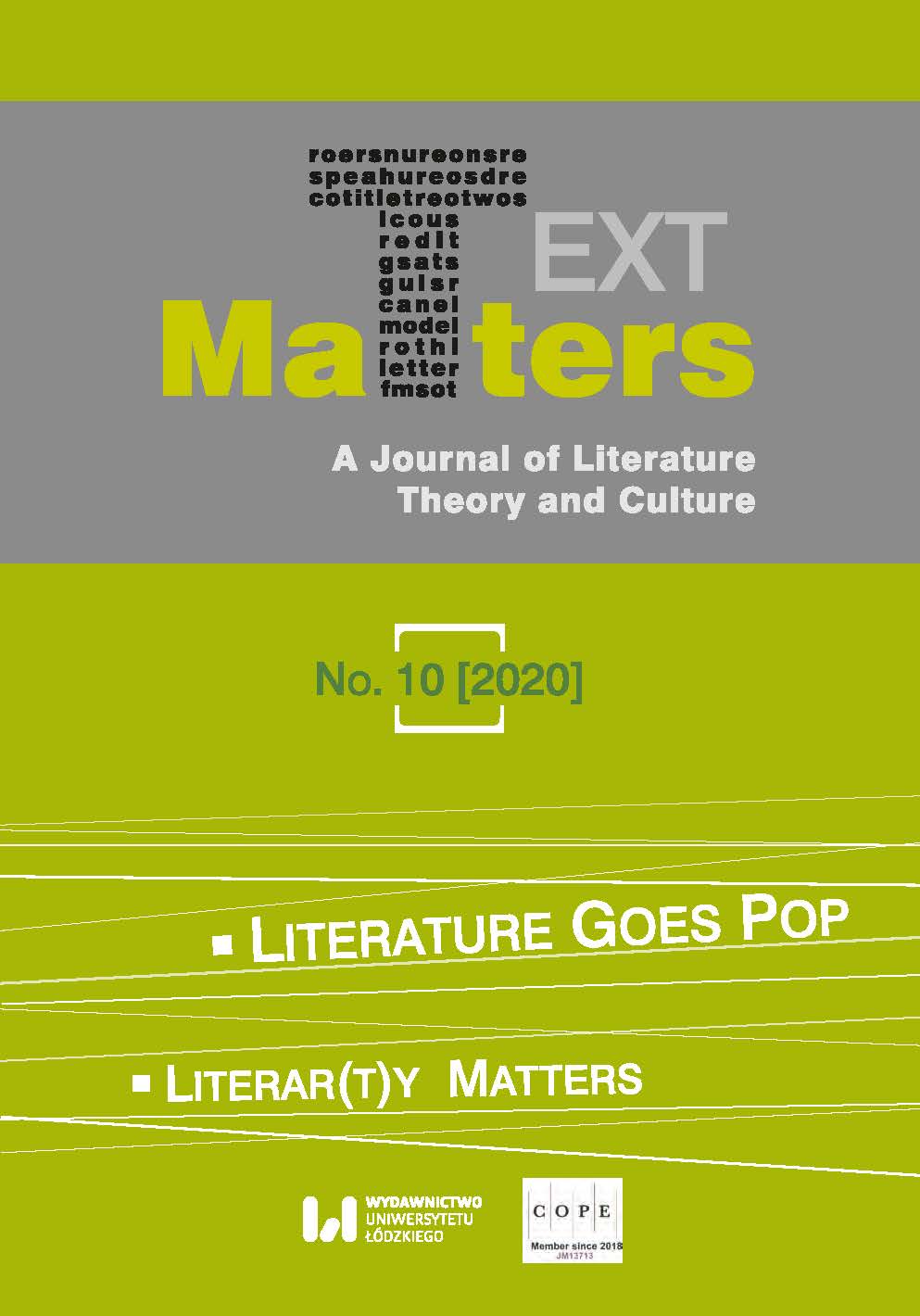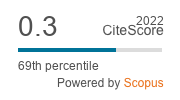“Our Eyes Adjust to the Dark”: The Cosmic Sublime in Tracy K. Smith’s Life on Mars
DOI:
https://doi.org/10.18778/2083-2931.10.20Keywords:
Tracy K. Smith, American poetry, the cosmic sublime, the postmodern sublime, elegyAbstract
The cosmic sublime, as the most spectacular manifestation of the natural sublime, offers rich stimuli for the literary imagination, as well as for various interactions between science, culture and art. In her book of poetry Life on Mars (2011), Tracy K. Smith uses tropes of cosmic perspective, scientific gaze and interplanetary travel to problematize the relationship between human finitude and the boundless unknown of the universe. Written after the death of her father, who was one of the engineers of the Hubble telescope, the volume links personal elegy and the work of mourning with philosophical questions about the relationship between the self and scientifically framed visions of the cosmos. The primary intention of my study is to examine the strategies and implications of the poet’s revisionary engagement with the aesthetics, rhetoric, popular mythology and mysticism of the spatial infinite. Smith employs the cosmic sublime not only as a spatial mode of perception but also as a metaphor of the emotional response to death. Her adaptation of the category expands the frame of reference for the purposes of an existential inquiry into the nature of humanity and transcendence. The celebration of imaginative freedom and modern science’s command of nature is further linked to constant apprehension about the human abuse of power and to anxieties triggered by the sublime mythology of transcendence, informed by a desire for dominating the other to the point of possession.
Downloads
References
Benson, Michel. Stanley Kubrick, Arthur C. Clarke and the Making of a Masterpiece. New York: Simon & Schuster, 2018. Print.
Google Scholar
Bowie, David. Hunky Dory. RCA Victor, 1971. CD.
Google Scholar
Bowie, David. Space Oddity. Phillips, 1969. CD.
Google Scholar
Bowie, David. The Rise and Fall of Ziggy Stardust and the Spiders From Mars. RCA Victor, 1972. CD.
Google Scholar
Bowie, David, and Mick Rock. Moonage Daydream: The Life and Times of Ziggy Stardust. London: Cassell Illustrated, 2005. Print.
Google Scholar
Chapman, Ian. Experiencing David Bowie: Listener’s Companion. Lanham: Rowman & Littlefield, 2015. Print.
Google Scholar
Critchley, Simon. Bowie. New York: OR Books, 2014. Print. https://doi.org/10.2307/j.ctv62hdz5
Google Scholar
DOI: https://doi.org/10.2307/j.ctv62hdz5
Deguy, Michel. “Discourse of Exaltation: Contribution to Rereading of Pseudo-Longinus.” Of the Sublime: Presence in Questions. Ed. Jean-François Courtine et al. Trans. Jeffrey S. Lilbrett. Albany: State U of New York P, 1993. 5–24. Print.
Google Scholar
Deleuze, Gilles, and Félix Guattari. A Thousand Plateaus. London: Continuum, 1988. Print.
Google Scholar
Elkins, James. “Against the Sublime.” Beyond the Finite: The Sublime in Art and Science. Ed. Roald Hoffman and Iain Whyte. Oxford: Oxford UP, 2011. 75–90. Print.
Google Scholar
Epstein, Josh. The Sublime Noise: Musical Culture and the Modernist Writer. Baltimore: Johns Hopkins UP, 2014. Print.
Google Scholar
Forsey, Jane. “Is a Theory of the Sublime Possible?” Journal of Aesthetics and Art Criticism 65.4 (2007): 381–89. Print. https://doi.org/10.1111/j.1540-594X.2007.00271.x
Google Scholar
DOI: https://doi.org/10.1111/j.1540-594X.2007.00271.x
Jameson, Fredric. “Postmodernism, or, The Cultural Logic of Late Capitalism.” New Left Review 146 (1984): 59–92. Print.
Google Scholar
Jameson, Fredric. Postmodernism, or, The Cultural Logic of Late Capitalism. Durham: Duke UP, 1991. Print.
Google Scholar
DOI: https://doi.org/10.1215/9780822378419
Johnson, Kathryn. “David Bowie Is.” David Bowie: Critical Perspectives. Ed. Eoin Devereux, Aileen Dillane and Martin J. Power. New York: Routledge, 2015. 34–82. Print.
Google Scholar
Kant, Immanuel. Critique of Judgment. Trans. James Creed Meredith. Oxford: Oxford UP, 1952. Print.
Google Scholar
Kessler, Elizabeth A. Picturing the Cosmos: Hubble Telescope Space Images and the Astronomical Sublime. Minneapolis: U of Minnesota P, 2014. Print.
Google Scholar
Kolker, Robert. A Cinema of Loneliness: Penn, Stone, Kubrick, Scorsese, Spielberg, Altman. Oxford: Oxford UP, 2000. Print.
Google Scholar
Land, Stephen K. From Signs to Propositions: The Concept of Form in Eighteenth Century Semantic Theory. London: Longman, 1974. Print.
Google Scholar
Lochhead, Judy. “The Sublime, The Ineffable, and Other Dangerous Aesthetics.” Women and Music 12 (2008): 63–74. Print. https://doi.org/10.1353/wam.0.0004
Google Scholar
DOI: https://doi.org/10.1353/wam.0.0004
Lu, Mingjun. “The Cosmic Sublime in the Aesthetics of Longinus and Zhuangzi.” Neohelicon 45 (2018): 689–709. Print. https://doi.org/10.1007/s11059-017-0409-6
Google Scholar
DOI: https://doi.org/10.1007/s11059-017-0409-6
Luca, Vincent Arthur De. Words of Eternity: Blake and the Poetics of the Sublime. Princeton: Princeton UP, 2014. Print.
Google Scholar
Lyotard, Jean-François. “Answering the Question: What is Postmodernism?” The Postmodern Condition: A Report on Knowledge. Trans. Régis Durand. Minneapolis: U of Minnesota P, 1984. 71–84. Print.
Google Scholar
Lyotard, Jean-François. Lessons on the Analytic of the Sublime. Trans. Elizabeth Rottenberg. Stanford: Stanford UP, 1994. Print.
Google Scholar
Lyotard, Jean-François. “On What is Art.” The Lyotard Guide and Reader. Ed. Keith Crome and James Williams. Trans. Keith Crome. New York: Columbia UP, 2006. 339–50. Print.
Google Scholar
Lyotard, Jean-François. “Presenting the Unpresentable: The Sublime.” Trans. Lisa Liebmann. Artforum 20.8 (1982): 64–69. Print. https://doi.org/10.1097/00006534-198207000-00014
Google Scholar
DOI: https://doi.org/10.1097/00006534-198207000-00014
Lyotard, Jean-François. The Assassination of Experience by Painting, Monory. Tans. Rachel Bowlby. London: Black Dog, 1998. Print.
Google Scholar
Lyotard, Jean-François. The Differend: Phrases in Dispute. Trans. Georges Van Den Abbeele. Minneapolis: U of Minnesota P, 1988. Print.
Google Scholar
Lyotard, Jean-François. The Postmodern Condition: A Report on Knowledge. Trans. Régis Durand. Minneapolis: University of Minnesota P, 1984. Print.
Google Scholar
Michelson, Annette. “Bodies in Space: Film as Carnal Knowledge.” Artforum 7 (1969): 54–67. Print.
Google Scholar
Nancy, Jean-Luc. “The Sublime Offering.” Of the Sublime: Presence in Questions. Ed. Jean-François Courtine et al. Trans. Jeffrey S. Lilbrett. Albany: State U of New York P, 1993. 25–54. Print.
Google Scholar
Nye, David. E. American Technological Sublime. Cambridge, MA: MIT, 1994. Print.
Google Scholar
Parks, Lisa. Cultures in Orbit: Satellites and the Televisual. Durham: Duke UP, 2005. Print. https://doi.org/10.1215/9780822386742
Google Scholar
DOI: https://doi.org/10.2307/j.ctv11hpmm4
Patterson, David W. “Music, Structure, and Metaphor in Stanley Kubrick’s 2001: A Space Odyssey.” American Music 22.3 (2004): 444–74. Print. https://doi.org/10.2307/3592986
Google Scholar
DOI: https://doi.org/10.2307/3592986
Pegg, Nicolas. The Complete Bowie. London: Titan, 2011. Print.
Google Scholar
Perone, James. E. The Words and Music of David Bowie. Westport, CT: Praeger, 2007. Print.
Google Scholar
Rogozinski, Jacob. “The Gift of the World.” Of the Sublime: Presence in Questions. Ed. Jean-François Courtine et al. Trans. Jeffrey S. Lilbrett. Albany: State U of New York P, 1993. 133–56. Print.
Google Scholar
Sage, Daniel. How Outer Space Made America: Geography, Organization, and the Cosmic Sublime. London: Routledge, 2016. Print.
Google Scholar
DOI: https://doi.org/10.4324/9781315587189
Shaw, Philip. The Sublime. London: Routledge, 2005. Print.
Google Scholar
Smith, Tracy K. Life on Mars. Minneapolis: Graywolf, 2011. Print.
Google Scholar
Smith, Tracy K. “Something We Need.” Interview by Charles H. Rowell. Callaloo 27.4 (2004): 858–72. Print. https://doi.org/10.1353/cal.2004.0180
Google Scholar
DOI: https://doi.org/10.1353/cal.2004.0180
Smith, Tracy K. “The Space Poet.” Interview by Jascha Hoffman. Nature 24 Nov. 2011: 477. Web. 20 Nov. 2018. https://doi.org/10.1038/479477a
Google Scholar
DOI: https://doi.org/10.1038/479477a
Tashiro, C. S. Pretty Pictures: Production Design and the History of Film. Austin: U of Texas P, 1998. Print.
Google Scholar
DOI: https://doi.org/10.7560/781566
Walker, Alexander. Stanley Kubrick Directs. New York: Harcourt Brace Jovanovich, 1971. Print.
Google Scholar
Weiskel, Thomas. The Romantic Sublime: Studies in the Structure and Psychology of Transcendence. Baltimore: Johns Hopkins UP, 1976. Print.
Google Scholar
Wilson, Rob. The American Sublime: The Genealogy of the Poetic Genre. Madison, WI: U of Wisconsin P, 1991. Print.
Google Scholar
Wilson, Rob. “The American Sublime.” Amerikastudien/American Studies 43.3 (1998): 517–27. Print.
Google Scholar
Downloads
Published
How to Cite
Issue
Section
License

This work is licensed under a Creative Commons Attribution-NonCommercial-NoDerivatives 4.0 International License.













